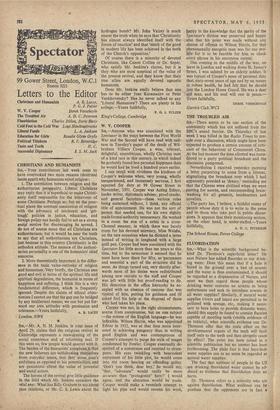W. V. COOPER
SIR,—Anyone who was associated with the Spectator in the years between the First World War and the Second will have read with sad- ness in Tuesday's paper of the death of Wil- braham Villiers Cooper, a wise, tolerant, delightful, unambitious, wholly Christian man of a kind rare in this century, in which indeed he probably found less personal happiness than he would had he lived a hundred years earlier.
I can recall with vividness the kindness of Cooper's welcome when, very young, wholly inexperienced, and immensely nervous, I first reported for duty at 99 Gower Street in November, 1931. Cooper was Acting Editor, leader writer, diplomatic adviser, proof-reader, and general factotum—these various roles being sustained without, I think, any official title of appointment. He was not the sort of person that needed one, for his own dignity made formal authority unnecessary. He worked in a room the size of a cabin in a cross- Channel steamer, in which there was barely room for his devoted secretary, Miss Walshc, on the rare occasions when he dictated a letter instead of writing in longhand with a large quill pen. Cooper had been associated with the Spectator for little more than ten years at this time, but to the newcomer it seemed that he must have been there for fifty, so 'permanent and essential a part of the structure did he seem. As things turned out, very shortly after-, wards most of his duties were redistributed among new recruits to the staff and Cooper was left with little but proof-reading to do. His demotion in the office hierarchy he ac- cepted with an absence of rancour that was typical of him, putting his guidance and (if asked for) his help at the disposal of those who' had taken his place.
Cooper was not, in the right circumstances, averse from compromise, but on one subject —the misuse of the English language—he was inflexible. Wilson Harris, who was appointed Editor in 1932, was at that time more inter- ested in achieving pungency than in writing good English and was contemptuous of Cooper's attempts to purge his style of usages condemned by Fowler. Cooper eventually de- spaired of a conversion and resorted to strate- gems. His eyes twinkling with benevolent enjoyment of his little plot, he would come into my room bearing an offending galley.
'Don't you think, dear boy,' he would say,
'that "advocate" would really be more accurate than "protagonist" here?' I would
agree, and the alteration would he made. Cooper would make a twentieth attempt to light his pipe and would resume his work,
happy in the knowledge that the purity of the Spectator's diction was preserved and happy also that his point was made without any chance of offence to Wilson Harris, for that phenomenally energetic man was far too pro- lific for it to be feasible for him to check every phrase in his enormous output.
One evening in the middle of the war, on leave in London and walking down St. James's Street, I was saluted by an elderly soldier. It was typical of Cooper's sense of personal duty that, sixty-seven years of age and by no means in robust health, he had felt that he should join the London Home Guard. He was a dear old man, and his soul will rest in peace.— Yours faithfully,










































 Previous page
Previous page